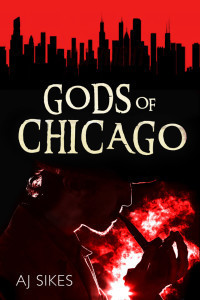Self-Editing–Common Errors and Easy Fixes
by Aaron Sikes, @SikesAaron
Many thanks to Elizabeth for hosting me today. My noir urban fantasy, Gods of Chicago, is currently on tour. Since I’m also an editor, Elizabeth asked me to share some tips for self-editing. If all you’ve heard is the (mistaken) advice that good writers never self-edit, then this post should help dispel the misconception (I hope it does at any rate). If, on the other hand, you’re well steeped in the self-editing tradition, then I’ve got my fingers crossed that I can share some new ideas. Please add your suggestions in the comments, too!
Basics of style
The first editor I worked with gave me a valuable lesson in tightening my prose, beginning with the elimination of the verb to be from my MS. This, like all rules regarding exclusion, should not be viewed as a hard and fast proscription. However, the ‘be’ verb works best when it is limited to those instances where no other verb fits the bill. If you can use another verb in place of the ‘be’ verb, your prose will improve and your readers will thank you.
‘Be’ is stative, not descriptive; compelling prose relies upon description to elicit responses and engagement from the reader. If you’ve been accused of telling rather than showing, the ‘be’ verb is probably the culprit.
1) Emma was transfixed. (telling, stative)
2) Emma’s mouth hung open and she stood frozen in place. (showing, illustrative)
Crutch phrases
We all have them. Those phrases that automatically populate our manuscripts, starting paragraphs during action sequences or opening new chapters, transitioning from one stage of a scene to the next. My guilty pleasure is using ‘as’ to indicate action. I see it happening in my head, so I end up writing it as though it were taking place at that very moment.
1. As Brand stepped through the doorway, he felt eyes on him and heard the click of a hammer being pulled back. He dropped to the floor and the bullet hit the doorjamb just above his head.
The first problem with this phrasing (for me anyway) is that I use it far too often. But from an editor’s standpoint, the critical problem is one of clarity and immersion in the story. The reader is being asked to focus on too many details in that first sentence. That means their eyes will likely pass right over it, not really absorbing the action. Sometimes we want the reader to barrel along through a scene, and that’s fine. But it takes a different kind of phrasing to create the tension and suspense of hearing your own death ratcheting back one click at a time.
2) Brand stepped through the doorway and let his foot hang above the floor. He felt eyes on him from somewhere in the darkened room. When he heard the click of a hammer being pulled back, Brand dropped to the floor. The bullet hit the doorjamb just above his head.
Redundancies and how to avoid repeating yourself or saying the same thing twice
Let me get my tongue out of my cheek here.
When it comes to redundancy, I can’t point to specific words or phrases that you’ll want to watch out for. But I can suggest you keep a notepad handy. Get in the habit of writing down any words you notice appearing more than once in your MS. For me, this amounted to the following list:
stumble/d, second later/moment later, huddle/d, hunker/ed, tears, crying, cried, scream/s/ed
I had my characters stumbling, huddling, hunkering, crying, and screaming ad nauseum. It wasn’t until I spotted ‘stumble’ twice in the same scene that I caught on and combed through for redundant verbs (you’ll notice that nearly all my offenses were, um, verbal). Like crutch phrases, we all have crutch verbs. Jot them down and do a full search for each one as part of your self-editing. Your prose will improve and grow tighter.
Related to redundancy is a common error we all make: duplicated words. You’ve seen them in published books and fear that you’ve left them in your MS waiting to jump out on unsuspecting readers. Instances of the the, or that that. For some reason, the and that are frequently doubled. It may be the result of a stop-start moment in our writing. With that, we may have two sentences running through our head at once, since we’re using a relative pronoun. Whatever the cause, save yourself the embarrassment and do a full search for the the and that that.
One other note on addressing redundancies. Use Scrivener or another program designed for authors. The search feature in Scrivener, for my money, makes handling revisions and self-editing almost enjoyable. Instead of endlessly clicking the “Find Next” button, you simply enter the term in the search window and get to see a list of chapters or scenes in which the searched for term appears. This becomes a nice little game of crossing things off a list as you tidy up each scene.
Aural interference
Watch out for common misspellings (teh, thta) and common confusions (form/from and the addition of a plural ’s’ before the verb ‘is’). These happen when our minds are working faster than our fingers. We hear (in our minds) the ultimate ’t’ in that, and our fingers type that letter before the preceding vowel. We mean to type from, but end up typing form instead, or vice versa. We’re going to use the ‘be’ verb (because no other verb works better in this particular instance) and we hear that ultimate voiced sibilant as we’re typing the preceding word, so that word ends up pluralized, or just has a wayward ’s’ tacked on. Do a search of your MS fors ‘is’ and make sure you haven’t fallen prey to this insidious from of error.
I hope you found my suggestions helpful. Please do add your best practices in the comments! What have you noticed as a common error that you were able to clean up during self-editing?
 Aaron Sikes (writing as AJ Sikes) is a writer of weird noir fiction and a freelance editor serving the community of independent authors. His stories have been published by Xchyler Publishing, KnightWatch Press, and Fox Spirit Books. Follow him @SikesAaron and sign up for the Gods of Chicago newsletter to get the latest updates on Mitchell Brand’s adventures and story world extras. If you need editing assistance with your manuscript, please stop by ajsikes.com.
Aaron Sikes (writing as AJ Sikes) is a writer of weird noir fiction and a freelance editor serving the community of independent authors. His stories have been published by Xchyler Publishing, KnightWatch Press, and Fox Spirit Books. Follow him @SikesAaron and sign up for the Gods of Chicago newsletter to get the latest updates on Mitchell Brand’s adventures and story world extras. If you need editing assistance with your manuscript, please stop by ajsikes.com.
Gods of Chicago is available now as a Kindle ebook on Amazon and Amazon UK.
The post Self-Editing–Common Errors and Easy Fixes appeared first on Elizabeth Spann Craig.



